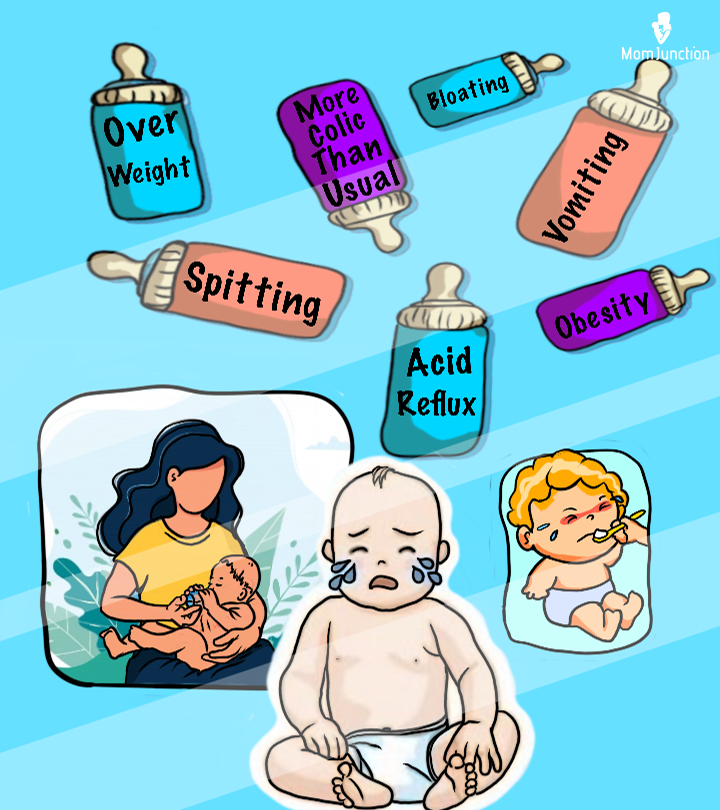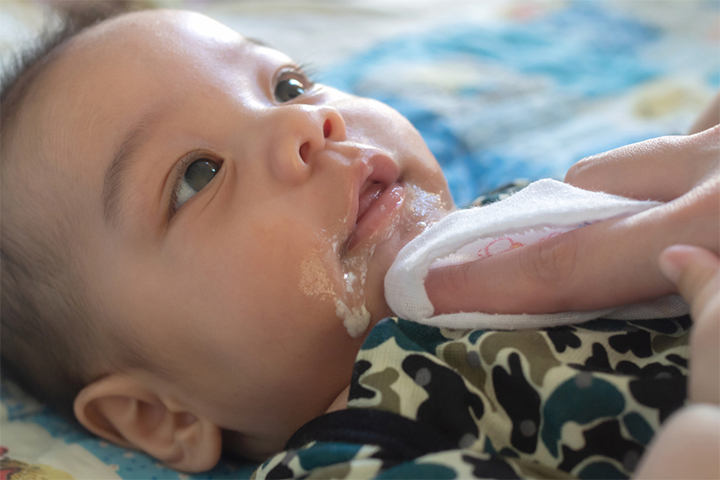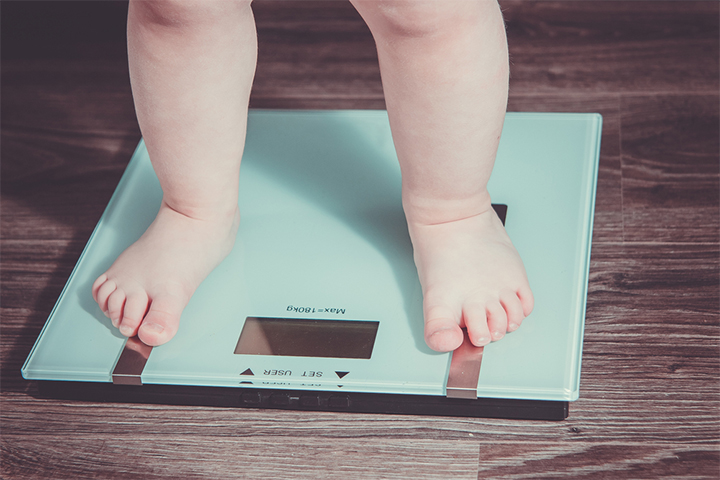Overfeeding a baby is fairly uncommon, although possible. Babies self-regulate feeding and give cues when they are hungry or full, and you need to spot and decipher these signs or cues to know when to stop feeding. However, sometimes, you might miss these signals and continue feeding the baby, leading to overfeeding.
Is missing the cues the only reason parents overfeed their babies, or could there be other reasons as well? Read on as we tell you whether or not you can overfeed a newborn, the common causes of overfeeding, the peculiar signs that the baby is being overfed, complications of overfeeding, and tips to prevent overfeeding your baby.
What Causes Overfeeding In Babies?
Things that lead to overfeeding in babies include:
- Feeding milk or formula through bottle: According to the American Academy of Pediatrics (AAP), formula-fed infants are at a higher risk of overfeeding because formula milk is usually fed through bottles (1). Bottles allow a free flow of milk, so the baby keeps getting a constant drip of milk even when they are full. A baby can overfeed on cow milk (if they are older than one year) and breast milk in other cases (2). Breast fed babies are usually not overfed.
Aubrey Phelps, MS, RDN, CLC, and author of the “Big book of baby-led weaningiXA method to introduce babies to solid foods by offering them different types of food and letting them feed themselves” explains, “Babies like to suck. When breastfeeding, babies can do what’s known as “non-nutritive sucking,” which means sucking without actually pulling any milk out. Essentially, using the nipple like a pacifier.
“But, with a bottle, that’s not an option. If they suck, they will get some milk, whether they want it or not. So babies may continue sucking or seem “hungry” because they want to suck more. If formula comes with that, then they’ll accept it.”
- A large feeding bottle: A study noted that infants fed from larger feeding bottles are often overfed and thus tend to become overweight. Encouraging the child to finish the entire bottle, regardless of its size, can lead to overfeeding and eventually obesity.
- Coaxing the baby to feed: Babies give you cues when they are full. Some signs include not sucking at the bottle nipple or turning away from the nipple. Some parents may coax the child to feed by putting the nipple in their mouth repeatedly, forcefully overfeeding them.
“Parents may keep offering the bottle to try to “get” the baby to finish it simply because they can see there’s still formula left and feel like the baby “needs” to get it all. When breastfeeding, you have no actual idea how much baby is getting unless you’re always doing weighted feeds,” adds Phelps.
- Using the bottle as a pacifier: Parents may use the bottle as a means to calm down the baby every time they throw a tantrum, thereby giving them more food than they need. To avoid that, use a pacifier instead of a bottle to calm down a cranky baby.
- Introducing solids early: It is best to give solids to a baby after the age of four months. According to the experts at Stanford Children’s Health, starting solid foods sooner can make the baby eat more than their body needs, which is nothing but overfeeding (3).
Dr. Taylor Arnold, a pediatric nutrition expert says, “ Mixing formula incorrectly (too much powder to water) can be one cause of overfeeding baby.
Sometimes parents may overfeed their baby and not be aware of it. It is, thus, vital to know about the signs of overfeeding the baby.
What Are The Signs Of Overfeeding A Baby?
An overfed baby will display the following signs:
- Repeated spitting: Babies spit up in general, but may do so more frequently when they are overfed (4). You may also notice increased burping in overfed babies, along with spitting up and dribbling milk. This might suggest the baby expels excess air and milk consumed during feeds. Spit-ups with burps could be more common in formula-fed babies than breastfed ones (5).
“While it may look like a lot, spit-up is usually only a small portion of the total feed. Feed again only if the baby is showing hunger cues like rootingiXA natural reflex in babies that help them to latch onto the breast or bottle, attempting to latch, tightly clenched fist, and fussing,” clarifies Dr. Arnold.
- Bloating and gas: Drinking from the bottle can cause the baby to gulp a lot of air. It can make the baby’s stomach bloated and cause discomfort.
- More coliciXWhen a healthy baby cries continuously for a long period than usual: All the bloating, gas and frequent passing of loose stools or diarrhea will create a lot of discomfort for the little one, which will lead to a colicky baby.
- Demand for more than 32oz (1064ml) of formula/breast milk a day: Even babies who are a year old do not require more than 30oz (887ml) of formula milk or breast milk in a day (6). A little over 30oz may not be abnormal but according to the American Academy of Pediatrics (AAP), a baby demanding more than 32oz (1064ml) of formula feed or breast milk in a day is unusual and should be checked by a doctor (7) (8).
Zara, a mother of a two-year-old, shares how her child’s excessive breastfeeding habits led to challenges with sleep and weight gain. She says, “From day one, Cian was constantly eating. At least every hour and a half, he would feed, and for the most part, these feeds would last upwards of 60 minutes.
“As the months passed, Cian continued to breastfeed. He ate a lot. So much so that he didn’t find much time to sleep, his weight steadily increased, and by only two months old, he was in the 99th percentile (i).” - Choking: The baby cannot choke or gag directly from receiving too much breast milk or formula, nor does choking indicate an overfed baby. However, an oversupply or overflow of breast milk and an overactive let-down may lead to overfeeding, providing too much milk to the baby in a shorter time, which may obstruct the baby’s airway and cause choking (9) (10).
These are the usual signs of overfeeding, which are evident during each feed. Ignoring them can lead to certain complications.
What Are The Complications Of Overfeeding A Baby?
Chronic overfeeding can lead to:
- Overweight and obesity: Since babies constantly get surplus food, they also get excessive calories that accumulate within the body and cause abnormal weight gain. The World Health Organization revealed that, in 2020, 39 million children under the age of five were either overweight or obese.
- Makes acid reflux worse: If the baby has acid reflux or gastroesophageal reflux diseaseiXA condition in which the stomach’s contents flow backward into the food pipe, leading to heartburn (GERD), then overfeeding can make the condition worse. Babies with gastrointestinal problems like GERD will display deterioration of symptoms when they begin to overfeed.
- Vomiting: Overfed babies may vomit after a feed. Chronic vomiting may leave little food for the stomach to digest, thus leading to health problems in the long run.
How To Prevent Overfeeding In Babies?
You may take the below steps to prevent overfeeding:
- Breastfeed: Pediatricians state that the chances of overfeeding are little when you breastfeed the baby (11). Even if the baby holds on to the nipple long after the feed, they will not get a constant supply of milk as they do from the bottle. The baby gets breast milk only when they suckle, which makes overfeeding almost impossible in such cases (12).
- Try paced bottle feeding: Paced bottle feeding is a method of controlling the flow of milk from the bottle. It requires the baby to suck at the nipple just like they would on a breast nipple. Paced bottle feeding tries to mimic breastfeeding and is an excellent means to prevent overfeeding in infants (13).
- Maintain a feeding schedule: Maintain a feeding schedule, and the baby will adjust to it eventually. The baby then gets hungry at the same time each day and should be fed on time to avoid feeding more than usual between long intervals.
- Wait for the hunger cues: Look for signs of hunger like sucking at the fingers or moving their lips when touched gently. A baby who is hungry will latch on the nipple right away. Feed them only when they are hungry.
- Do not force the baby to eat: If the baby is full, then do not force them to feed more. Or you will end up overfeeding them.
Overfeeding a baby usually happens when you miss their signals to stop feeding. Using a large feeding bottle or coaxing a baby to feed can also cause overfeeding them. The habit may lead to spitting, bloating, and colic in some babies. Regular overfeeding can even cause obesity, acid reflux, and other health issues. Therefore, it is important to watch the baby’s signs when hungry or full to maintain a proper feeding schedule.
Key Pointers
- Overfeeding can lead to various health problems in children.
- Signs of overfeeding in babies include frequent spit-ups, excessive weight gain, and abdominal pain.
- Parents need to monitor their child’s eating patterns and stop feeding them when they appear to be full.
- Using a pacifier can help babies self-soothe and reduce the need for comfort food.
- It is important for parents to keep an eye on their baby’s weight and seek advice from a pediatrician if they have concerns about their feeding habits.
Are you overfeeding your baby? This informative video provides valuable knowledge on how excessive feeding can impact your little one’s health and well-being.













